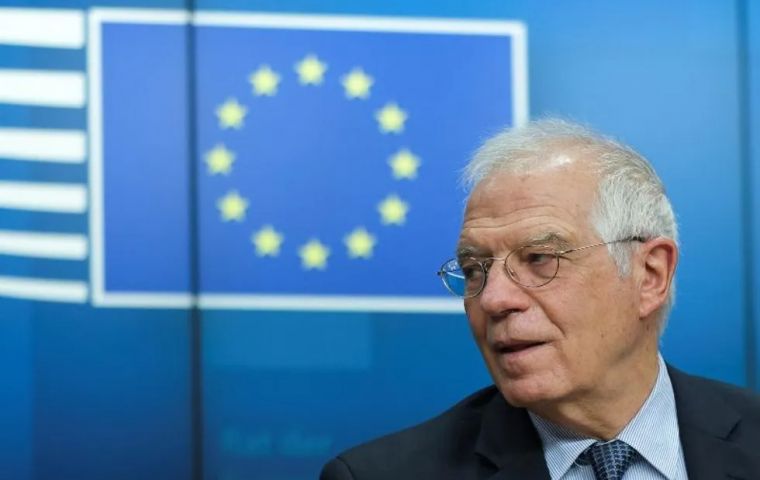MercoPress. South Atlantic News Agency
EU eyes CELAC for food; Mercosur “a more complicated issue”
 Europe looks to Latin America to mitigate the consequences of the Ukraine war, Borrell explained
Europe looks to Latin America to mitigate the consequences of the Ukraine war, Borrell explained Josep Borrell, the European Union's top diplomat, has said Latin America would host a CELAC meeting sometime next year, but admitted that ratifying the 2019 trade agreement with Mercosur was “a more complicated issue.”
Borrell's remarks came during a press conference in Brussels after a Summit of foreign ministers from the bloc.
A summit between the EU and CELAC has not taken place since 2015 and, in all fairness, it has not been convened this time around either, but Borrell said he believed that if consensus is reached, such an event might take place under Spain's pro tempore presidency of the EU, in the second half of 2023.
Borrell insisted that strengthening ties with Latin America was one of the issues discussed Tuesday, as diplomatic teams seek to mitigate the consequences of the war in Ukraine.
”These countries are also affected by the negative consequences of (Russian President Vladimir) Putin's war, in particular, rising prices and shortages of food, fertilizers, and energy, although this region is one of the big food producers in the world,” Borrell noted.
Mexico, Brazil, and Argentina are three key countries for the European Union, Borrell explained. CELAC (Latin America + the Caribbean) encompasses 33 countries, including two strategic partners (Mexico and Brazil), three G20 countries (Argentina, Mexico, and Brazil), and four OECD members.
According to Borrell, the region “is an important partner and we agreed to take a step forward in what we can call the other transatlantic relationship,” beyond the one with the United States.
The Spanish diplomat also highlighted the importance of modernizing and ratifying the EU's current trade agreements with Mexico and Chile, dating back to 2016 and 2017, respectively, so as to adapt these documents to present-day reality.
And how long will European societies be able to endure these levels of inflation, in energy prices, with the Russian threat of cutting off the gas in winter? “European societies cannot allow themselves to be fatigued”, said Borrell,
On the day when the EU foreign ministers agreed on another 500 million euros to buy arms for Ukraine, Borrell insisted that Russian President Vladimir Putin was banking on Europe's democratic fatigue to settle the ongoing conflict in his favor.
Following Western sanctions, Russia has cut the supply of oil and gas to European countries, thus toughening the living conditions of Europeans. “But we cannot afford such democratic fatigue,” Borrell stressed.
“We are using the mechanisms available to us,” said Borrell: “There are rising prices for energy and food products. How can there not be? There is an increase in energy prices. Of course, there are. And food products? Of course, there are. How can there not be? If there are 20 million tons of wheat that do not reach the markets, it is obvious that the markets are going to react upwards. But these are consequences of war. Wars have these consequences. Fortunately, we do not suffer from bombings like the Ukrainians and we do not have to go into exile from our homes. But yes, the whole world suffers the consequences of war,” Borrell explained.
War is waged with guns “on the territory where the war is taking place and it is also made by blocking the access of food to the markets. European society has to be aware that this is a test of endurance and we have to be resilient enough to continue to support Ukraine. We have no other solution. Neither do they,” he added.




Top Comments
Disclaimer & comment rulesCommenting for this story is now closed.
If you have a Facebook account, become a fan and comment on our Facebook Page!